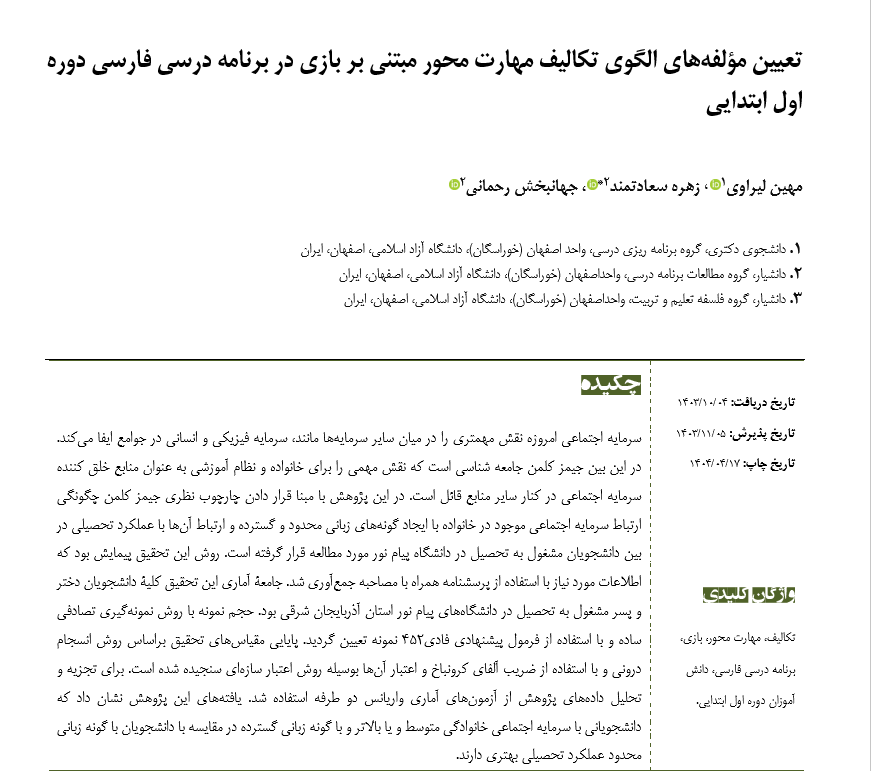Identifying the Components of a Skill-Based Homework Model Based on Play in the Persian Language Curriculum of the First Grade of Elementary School
Keywords:
Homework, skill-based, games, Persian curriculum, first grade elementary studentsAbstract
This study aimed to identify the components of a skill-based homework model based on play in the Persian language curriculum of the first grade of elementary school. The research employed a qualitative method using thematic analysis. The statistical population included existing documents available in credible databases and websites within the time frame of 2009 to 2023. The sampling method was purposive, and data collection was conducted using an exploratory inductive approach through note-taking. The collected data were analyzed using a three-stage coding method. The results indicated that the components of the skill-based homework model based on play in the Persian language curriculum of the first grade of elementary school include skill development, empowerment, social development, goal-oriented individual development, thinking development, practical learning development, spiritual and emotional development, cognitive development, planning, groundwork, learning environment, teacher's role, textbook content, homework content, individual factors, motivational strategies, participatory strategies, creativity-based strategies, activity-based strategies, play-based strategies, research-based strategies, continuous assessment, oral assessment, and written assessment.
Downloads
References
Por Jafari shir Joposht M, Shakibaei Z, Zarei H. `Provide a Model for Parents' Educational Assistance to Empower
Online Education in Critical Situations. Sociology of Education. 2024;10(1):31-44. doi: 10.22034/ijes.2023.2006736.1434.
Suaco T. The Integration of Sustainable Development Goals in the Secondary Science Curriculum of Cordillera
Administrative Region. Diversitas Journal. 2024;9(1_Special). doi: 10.48017/dj.v9ispecial1.2835.
Tolentino R. Curriculum Frameworks and Educational Programs in AI for Medical Students, Residents, and Practicing
Physicians: Scoping Review. Jmir Medical Education. 2024;10:e54793. doi: 10.2196/54793.
Zhu X. Curriculum System Reform for Application-Oriented Undergraduate Course of Visual Communication Design
Major in the Era of Artificial Intelligence. 2024. doi: 10.4108/eai.24-11-2023.2343564.
Martins C. Trying to Undo the Colonialities of Arts Education: The Construction of a Workbook as Curriculum‐
(Un)Making. International Journal of Art & Design Education. 2024;43(3):415-32. doi: 10.1111/jade.12511.
Silver J, Galen WM, Alexander, Lewis AJ. Curriculum Planning for Better Teaching and Learning. Mashhad: Astan
Quds Razavi Publications; 2024.
Mohammadzadeh H, Bagheri L, Bagheri S, Yousefzadeh L, Biabangard R, editors. Enhancing Learning in Elementary
Students Through Skill-Based Assignments. The First International Conference on Sociology, Social Sciences, and Education
with a Future-Oriented Approach; 2023.
Rastegar T. Evaluation in Service of Education: Tehran: Monadi Tarbiat Cultural Institute; 2020.
Mohammadi A, Rahmani K. The Impact of Skill-Based and Creative Assignments on Elementary Students' Learning.
Ormazd Research Journal. 2019(47):220-31.
Maleki H. Curriculum Planning (A Practical Guide): Tehran: Madreseh Publishing; 2021.
Attaran A, Mousapour N, Attaran M, Hoseinikhoh A. Designing and Validating a Curriculum Revision Model for
Teacher Training in Iran. 2019.
Jalesian F. Development and Testing of a Skill-Oriented Task Model in Elementary Schools in Iran: Master's Thesis
in Educational Management; 2020.
Sedighi Arfaei F, Golestani Fard A, editors. A Study of Game-Based Education and Its Relationship with Students'
Learning and Academic Achievement. World Conference on Psychology and Educational Sciences, Law, and Social Sciences
at the Start of the Third Millennium; 2016.
Seif AA. Modern Educational Psychology: Psychology of Learning and Teaching: Tehran: Doran Publishing; 2012.
Safari S, Hakimzadeh R, Dehghani M, Gholamali Lavasani M. Presentation of a Conceptual Model for Game-Based
Learning with an Emphasis on Skill Acquisition: A Meta-Synthesis Study. Educational Sciences. 2021;28(2):97-112.
Sahraei RM, Meidani F. Journal of Literary Text Research. 2011(47).
Anderson M. The importance of play in early childhood development. Family and Human Development. 2010:547-

Downloads
Published
Submitted
Revised
Accepted
Issue
Section
License
Copyright (c) 2025 Journal of Study and Innovation in Education and Development

This work is licensed under a Creative Commons Attribution-NonCommercial 4.0 International License.










